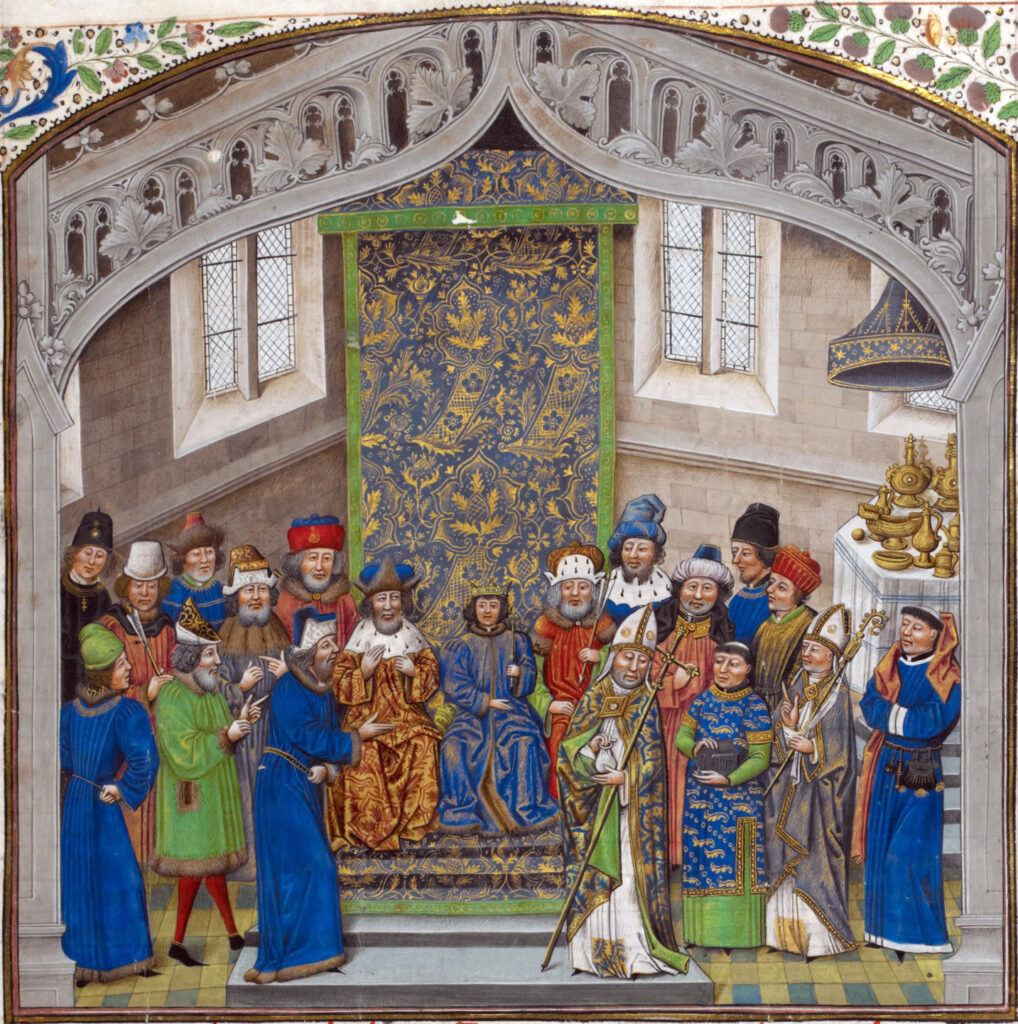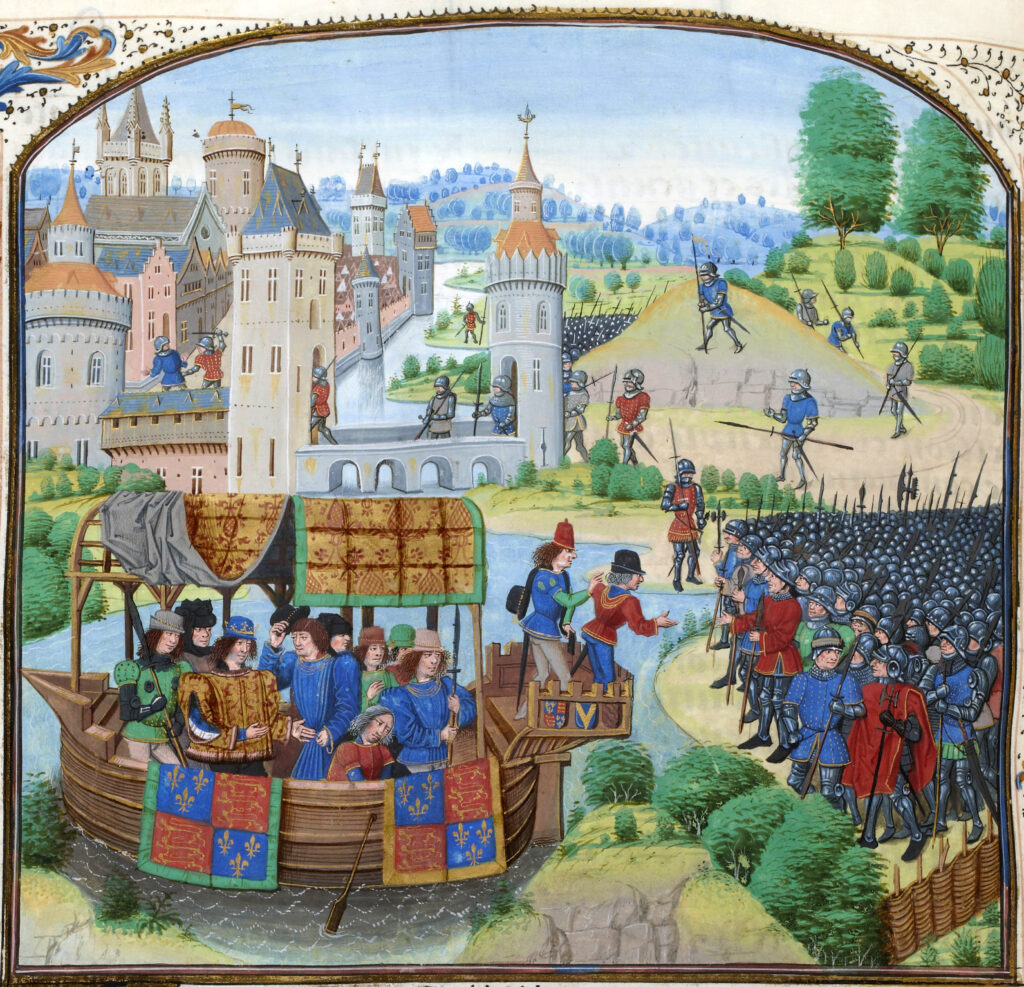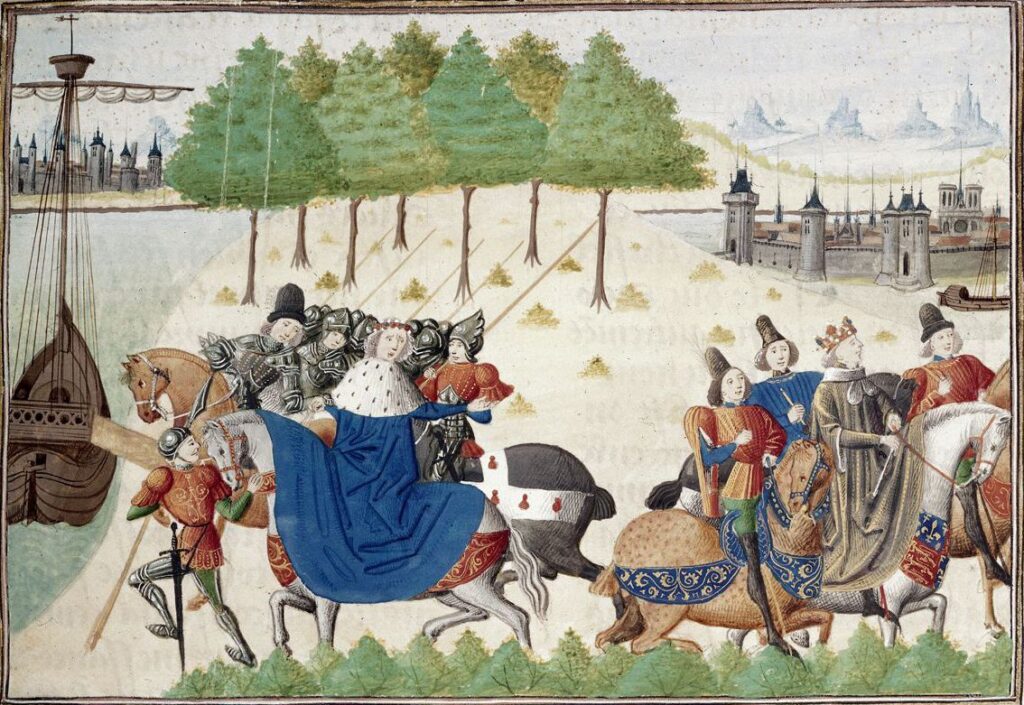
As the old biblical saying goes, “Woe to thee, O land, when thy king is a child”. The stresses on the country are easy to see, but no one seems to talk about how difficult it was to BE that child. Growing up without a (or at least, an active) father must have been compounded by all the expectations heaped upon that little head. In Richard’s case, he wasn’t even the first-born son. His elder brother, Edward, had died at the age of five just before his family’s return to England in 1371; Richard was not quite four. There were to be no more children, so the pressure was on.
Both Edward, the Black Prince and the ailing Edward III had real concerns about the succession. Primogeniture, as we know it, was not yet the law of the land. Young Richard had three uncles, and John of Gaunt, the next brother after Edward had already made plenty of enemies. So not only did the Black Prince on his deathbed oblige everyone to swear to support his son, King Edward is said to have put together an entail delineating the succession along male lines. He declared Richard the next heir and bypassed the descendants from his second son Lionel (already dead) through the daughter. I believe Gaunt would have been next in line; according to historian Michael Bennett, because of Gaunt’s unpopularity the entail was kept secret from the general public. How many copies were made was unknown, for a badly burned original (from the Cotton Library fire of 1731) wasn’t even discovered until the 20th century. Surely all of Edward III’s descendants knew about it.
Richard was ten years old when he was crowned king. Apparently because so many people feared that Gaunt would seize the crown for himself, there was no regency. The business of government was conducted by a Continual Council, at least until the Peasants’ Revolt broke out in 1381. By then Richard was fourteen, and he suddenly found himself thrust into a position of leadership. Gaunt was in Scotland, the next uncle Edmund Langley was on his way to Portugal, and the youngest uncle Thomas of Woodstock was in Wales. The chancellor, Archbishop Sudbury, immediately resigned his post—not that he was fit for the job in the first place. There was no army to call on—only the soldiers manning the Tower of London. Richard had to face the marauding rebels on his own, and with a couple of false starts along the way, he ultimately manage to save London from their depredations. He had proved himself worthy of the name Plantagenet.

One would think that his courage would have impressed his elders. Not a whit. Promises had been made along the way that couldn’t be kept, and Richard was to blame for making them—not that anybody else had a better idea. The king was dragged along as the government reasserted itself, holding judgement on the rebels who felt themselves betrayed. Many ringleaders were hanged and the king was held responsible. His moment of glory was fleeting and now he was on the defensive.
Richard kept his few friends and advisors close, making them the target of jealous and unscrupulous magnates. The most unscrupulous of all was Richard’s uncle Thomas of Woodstock, made Duke of Gloucester in 1385. The new title—which he felt he deserved—did nothing to counteract his conviction that the king was badly advised. As soon as John of Gaunt left the country to pursue the crown of Castile, Gloucester went on the offensive. Gathering together a powerful faction led by himself, the Earl of Arundel, and the Earl of Warwick, Gloucester “appealed” (accused) Richard’s favorites, initiating a legal procedure to drive them from the king’s presence. (Even he couldn’t attack the king directly.) The trio became known as the Lords Appellant, and were soon joined by Henry Bolingbroke and Thomas Mowbray. Gaining steam, their scheme was extravagantly successful, culminating in the Merciless Parliament of 1388. By the time the dust settled, eight of Richard’s friends and favorites had been put to death, three had fled the country, and over forty others had been ejected from court. The king was all alone, and friendless. Except for his queen.
Nonetheless, Richard trusted in his special eminence. He was an anointed king, after all, and nobody could take that from him. After licking his wounds for a year, he came back stronger and wiser, declaring his majority and taking his place back at the head of the government. The Lords Appellant could do nothing against him, and they had pretty much lost interest anyway. Their job was done.
For the next seven years, England was quiet and prosperous. As professor Hutchison would say, political executioners were unemployed. But suddenly, without warning, Richard launched a brutal revenge against the Lords Appellant, throwing his government into a tailspin. What happened? Why ruin a good thing? Historians have been baffled ever since. Perhaps the death of his queen removed any restraint over his bad tendencies. Some think the king went insane; others wondered if he was planning his revenge all along and just waited for the right moment. It’s possible that the Duke of Gloucester was fomenting trouble again. He got his “just desserts”, and it’s possible that Richard would have gotten away with his private retribution except that he didn’t stop there.

For the last three years of his reign, King Richard exhibited an incredible paranoia, fearing retaliation at any moment and practically holding the whole populace responsible for his earlier humiliation. This period of his reign is usually called his Tyranny. He collected over 600 Cheshire archers as his personal bodyguard (who terrorized the country wherever they went). He imposed fines on whole communities and slapped them with “blank charters” to be filled in at his discretion if they caused any trouble. He initiated forced loans to pay for his upcoming campaign to Ireland (though he was not the first nor the last king to do so). Once he exiled Henry Bolingbroke and took possession of the Lancaster endowments, he went too far. For the second time in his life Richard found himself alone and abandoned—with the exception of a handful of supporters. This time there would be no coming back. The king’s experiment with absolute monarchy was a failure, not to be revived until Henry VIII applied it to “perfection”.